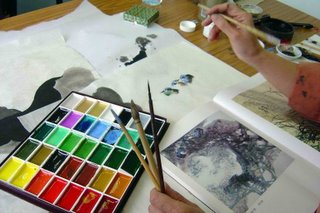Saturday, December 23, 2006
A very fair and reasonable comment
I run into his blog and delightedly read through his fair and reasonable comment. It's really nice since he obviously sated very clear and accurate of the purpose of my setting up this podcast.
you can read it here.
Tuesday, December 19, 2006
The use of a dictionary
Well, if you are like me 20 years ago when I was learning English, I guarantee that you will fail.
20 years ago, I thought the reason that I couldn't speak English was I didn't have enough vocabulary. So I bought a dictionary like book English Vocabulary 10000. This book guaranteed me that after remembered all the words there, I could speak great English.
It took me four to five months to get through the book from cover to cover. I learned a lot of interesting words that I don't remember now. But guess what, I still couldn't speak English. And I realized that by just expanding vocabulary doesn't work. I have to try something else.
Monday, December 18, 2006
Diet Chocolate Cake
But there was a TV show I watched last week said something different. They invented diet chocolate cake, low calorie pudding, and low calorie cookies. If you want to eat a lot and still be healthy, there is a way now!
Also, treasure this: if you spend 20 minutes a day to review your Mandarin or to listen to an audio lesson track, you will feel even better!
This is this holiday season's keep fit suggestion: diet chocolate cake + 20 minutes Mandarin/day
Friday, December 15, 2006
The habit of accomplish your goals
But accomplish more doesn't mean that you suddenly speak fluent Mandarin next week or next month. Accomplish more means you set up many many smaller goals and then achieve those small goals. Every step is an achievement, each week is a time to celebrate. Thus you get yourself into a habit of accomplish your goals.
You should feel good about yourself on every small step you made. You should be proud of yourself on every small goal you achieved. The very next small step is all you need to concentrate on, and this small step is very achievable as well.
In doing this, there is only one ultimate result in front of you: success.
Thursday, December 14, 2006
The inevitable bump
The way to handle it is also the same way to handle other inevitable bumps: Stick to your road map. Summon your extra strength to put one foot in front of another. Hang in there.
When the dark time is over, you will be happy that you didn't give up. You carried on.
Wednesday, December 13, 2006
It's time to formulate a road map
The importance of the road map is to break down a major task into many many small tasks, into many many smaller goals. So that you can ONLY focus on the next goal.
From my experience, most people can carry on basic simple conversations after they finish Intro level. In Intro Level, there are two books, Intro level A and Intro Level B. Each book has 10 lessons and two reviews. From now till the end of 2007, you have 52 weeks. Here is a basic road map (the assumption is that you are doing self-study):
Week 1 : Listen to Intro A lesson 1 audio lesson every day
Week 2: Finish Intro A workbook lesson 1 (10 exercises in total, so 2 exercises per day).
Week 3: Listen to Intro A lesson 2 audio lesson every day
Week 4: Finish Intro A workbook lesson 2 (2 exercises per day)
Week 5: Listen to Intro A lesson 3 audio lesson every day
Week 6: Finish Intro A workbook lesson 3
...
Week 11: Review lesson 1 - 5 by listening to the audio lessons
Week 12: Finish Intro A workbook review 1-5 exercises
...
Week 23: Review Lesson 6-10 by listening to the audio lessons
Week 24: Finish Intro A workbook review 6-10
...
Week 47: Review Intro B lesson 16-20 by listening to the audio lessons
Week 48: Finish Intro B workbook review 16-20
Week 49 - 52: It's time to celebrate your success and plan for your next road map. Also time for a great Christmas!
The key issue is that you need to set your road map step by step to carry on from where you are now to where you want to be, and make sure you follow your map. Don't rush too fast, neither too slow. Always ONLY focus on your next step!
Tuesday, December 12, 2006
Shoot for the stars!
Do you want to:
- Carry basic conversations
- Express your self freely
- Use natural speech when socializing with Chinese people
- Discuss world issues and all kinds of topics
If you don't know where you want to end up with, you won't go anywhere!
Set a goal! Shoot for the starts!
Monday, December 11, 2006
Make Year 2007 Your Most Successful Year
This is a borrowed quote:
The best time to learn Chinese is last year. The second best time is this year.
If you started in 2006 and carried on, it's time to appreciate how far you have gone. If you didn't start in 2006 and would like to learn, now is a good time to set a plan!
Friday, December 08, 2006
The Toilets in China
I agree that public toilets in most of the places are not great.
If all the public toilets are improved over night, things will be perfect. As life has taught us many times that nothing is perfect, so take this as part of the package of your China trip and enjoy more with talking to people, eating great Gong Bao chicken.
Wednesday, December 06, 2006
This is for those who have made amazing results.
Henry started his Mandarin lesson in Nov 2005. In a year time, despite all the trips, travels and work load, Henry made very impressive results by finishing Pre-intermediate B.
Tim and Wantanee started their lesson during mid 2004. During this one year and half, they had some very long breaks. They are really amazing people. They made the commitment, and they carried on.
Nathan started his lesson during the summer last year. He consistently studies and the result is amazing.
Doron started his lesson early this year. He completes all the exercises and will do more. This is what gives Doron an edge.
And there are always more.
One common trait of them is consistent and self-discipline.
I feel lucky that I can witness their success, or in some cases, be part of it.
Priceless Moment
Things like that are priceless for a language learner. It justified every effort you made.
What is the priceless moment you had?
Tuesday, December 05, 2006
What if you never had a chance to use Chinese
How many of you out there are putting 30 mins everyday for learning Mandarin and know you would probably never use it?
This reminds me that there are many people learning English in China. Some of them probably won't have any chance to use it, but they are happy to take a new adventure in an English speaking world. Why do they do this? What is the incentive?
My answer is that it's a self-satisfaction experience there. It happens when you are listening to radios, watching movies, reading books or newspapers. It's something out there that not so easy to master but ultimately satisfying to us humans.
Monday, December 04, 2006
Tips On How To Use Workbooks
Before you start doing all the exercises in your workbook, make sure you have learned the corresponding lessons in your students book, then you can:
1. Do all the written exercises first. In this way, you will see all the target words again and again, and this visual impact is important for further task.
2. Do 2-3 listening exercises. Make sure you understand 98%. If you have questions, go back to your book or ask your teacher, do a short revision
3. Finish the remaining listening exercises.
4. Review and further exercises.
MSL Featured Photo
http://www.msllearningcenter.com/our_students.htm
Also, if you have a great photo and would like to share with us, send it to me.
After all, it's sharing makes a good photo great!
Friday, December 01, 2006
Learning Mandarin is a Commitment
Using the same materials in different ways is a very good way to speed up the process. That is why I made students book, CDs, workbook, audio lessons. But still you need a year to finish Intro Level and Basic Level to develop into a relatively good proficiency.
My definition of advanced learners is near native. They can THINK in Mandarin. Anywhere less than that is not advanced. There is middle point between beginning to near native. At this point, you can communicate in any topics and can understand most of what other native speakers said. You can understand 50-60% of movies without subtitles, or 90% with subtitles, and maybe 30% of news. This point is Intermediate.
If you study consistently using Mandarin Express series, from beginning to intermediate it will take about 1.5 to 2 years. From there to advanced level may take another five to ten years. And after that, you are still learning as the language is a living thing.
So, learning Mandarin is a life long commitment.
Thursday, November 30, 2006
10 New Pre-Intermediate B Online Lessons Released!
The ten lessons are about:
11. Past event, present and future
12. Abilities, skills, careers
13. Personality traits and job preference
14. Aspects of countries, world knowledge
15. Describing recent experiences
16. Describing movies, actors/actresses, and movie directors. Oscar Awards.
17. Gestures and culture shock
18. Sleep and dreams
19. Predicament and dilemmas
20. Excuses and white lies
Check the lessons out at our online store.
Learning Mandarin is not confined to the classroom
It's in restaurant;
It's in taxies;
It's talking to people;
It's reaching;
It's communicating.
Wednesday, November 29, 2006
The Tones Are Important, But Not Essencial
For example, below is a text written in pinyin with no tone markers. You still can understand everything, can't you?
ni men hao. wo jiao dawei, wo shi mei guo ren. wo zhu zai shanghai, wo de nv peng you hen piao liang.
Tuesday, November 28, 2006
The Terracotta Warriors
More over, in Xi'an, there is exellent hand made noodles, dumplings, and other great fabulous food!
Monday, November 27, 2006
A Chinese Idiom for Today
冰冻三尺, 非一日之寒
bing dong san chi, fei yi ri zhi han
Saturday, November 25, 2006
Why there is NO English translation in podcast transcripts?
The reason is simple: To force you remember. And when you do that, it's more likely that you will remember.
This is from my personal experience. Whenever there is Chinese text and English text both available, I find myself only read Chinese part. If there is a new English word listed there with Chinese translation, I would remember the Chinese part better. Later on I remember I learned a new word and the meaning is such and such. But I can not remember what that word is.
If I learned a new word through guessing, or through English text, that word is staying with me.
To draw a conclusion, for all the Mandarin Chinese learner there, try to use something with no translation in your first language.
april
Friday, November 24, 2006
It's the motivation that gets you start...
This is what I see every time I go to my gym. I can see this motto printed on T shirts, or on the board. I totally agree with it, and can even use the same anology in learning Mandarin.
To form a good habit of learning certainly helps greatly.
If you go to gym two or three times a week, use that time listen to some Mandarin. In this way, you get double benefits!
(When I go to gym, I listen to English business news. I used to think business news is too fast for me. Now I am a lot better now.)
april
Wednesday, November 22, 2006
si And shi
Many Chinese people can't. People from the south, including Shanghai, Taiwan, and Guangdong, they can't different "si" and "shi" very clearly in their speech. But that doesn't stop people are communicating with one another in Putonghua. In fact, I enjoy speaking to Taiwan people, and I quite like their soft accent.
Therefore, context is far more important than constant drills of "zi, ci, si, zhi, chi, shi".
april
Tuesday, November 21, 2006
Proficient and Fluent
Any body can get fluent when they are answering the questions like, “what is your name?” or “how are you?”
But that doesn’t count when we refer to proficiency. A good degree in proficiency should lift you up from day to day functional conversation, for example, setting up an appointment, or bargaining in a market. Intro Level students can do that very well already. They are fluent in certain areas. However, they are not proficient.
Once you get to a certain proficiency level, you can discuss your life changes, the biggest achievement you had in your career, etc. People who finished Basic Level usually feel they have turned a corner. That corner is a transaction point to shift you from fluent to proficient.
april
Monday, November 20, 2006
Guess work
But when you are talking to your teacher in a class, it's better to understand every word there is. That is the education part in the word "educated guess". Random guss is not as good as educated one. Only after you chewed, analyzed, and digested all the words, sentences with your teacherduring a meaningful conversation, you can produce really good guess work when you are outside of a classroom.
april
Friday, November 17, 2006
3.5 hours a week
I recommend 3.5 hours a week. The best version is 0.5 hours each day for 7 days. The worst version is 3.5 hours in one day and nothing for the rest of the week.
april
Thursday, November 16, 2006
Input, Output and Audio Lessons
How to learn Mandarin Chinese effectively is about how to balance input and output. If you are paying a private tutor, it's also about how to make the most of it when you are with your tutor.
The basic input is sounds, words, patterns, meanings, sentences, or conversations, stories, etc. The basic output is your ability to carry on the conversations. How long you can carry on a meaningful conversation should determine your level.
Let's say the input part. It's a necessary stage. Without input, you will never speak the language, unless one day we are all like those people in Matrix, just load it up! Traditionally, lots of class time is spent on the basic input. Pronunciation, meaning, and repeat after teacher to try to get things right. Necessary guidance from teachers is essential, but sometimes things got stuck in one place and wasted too much time. This is where audio lessons fit the best. They can solve most of the problems in getting the pronunciation, pattern and meaning right. And they can also prepare you to speak to other people by first speaking to yourself. This alone will lift tremendous stress from students. If you have questions, ask your teacher. It's time saving.
The second part is output. Output requires practice. The first safe ground is to practice with your teacher. Teacher is patient, teacher knows how much you learned and therefore limits her/his language, teacher encourages you to speak even when you are not sure, teacher designs special activities to focus on your weak spots. Outside of classroom, things will get bumpy. Natural speech speed is the most difficult part to adapt, although many people believe that it is their vocabulary isn't enough. Most of the time, vocabulary is enough, it's the lightening speed that kills you. The excellent thing is that you have your teacher. The more meaningful practice you had with your teacher, the better you are in the real world.
If you do the basic input at home or at the airport, you will have a lot more time to practice with your teacher, also smile all the way in a class!
April
Wednesday, November 15, 2006
How to use podcast transcript
1. read aloud
2. look up the dictionary for the new words
3. write pinyin on top of the characters
4. listen to that podcast again and check your understanding
5. translate into your own language and translate back to Chinese
6. discuss the topics with your Chinese speaking friends
Monday, November 13, 2006
Workbook Basic Level A available on line!

Workbook Basic Level A is up online!
It is best used with Students Book Baisc Level A.
This Workbook has total 120 exercises, including 61 listening exercises in different forms and focuses. Here's some recommended steps on how to use all these materials:
Step 1: listen to Basic Level A audio lessons
Step 2: complete Basic Level A workbook
Step 3: practice speaking with people
Check everything out in www.msllearningcenter.com
Saturday, November 11, 2006
A Great Breakthrough In Technology
For example, if everybody downloads e books, it will save massive trees being chopped down just to print hundreds of books sitting in a warehouse.
Here's some changes on the cost we made:
Online Lessons Subscriptin (per month): before HKD1950, now HKD1050
Class/Net Fast Mandarin group lesson (10 weeks): before HKD6000, now HKD5000
Private lessons + Online Lessons (per month): before HKD4000, now HKD3500
Techonology saves money. To find out more on different classes or lessons, click www.msllearningcenter.com
Friday, November 10, 2006
Three Donts in Learning Speaking Mandarin
The second one: DO NOT learn new lesson everyday if you have a hard time trying to keep up with what you learned on previous days.
The third one: DO NOT only speak Mandarin, also write it. Write something, essays, journals, etc. in Mandarin helps, even when you are the only reader.
Saturday, November 04, 2006
A New Look of Our Website
For you who had sent emails, thank you!
Thursday, October 26, 2006
The Nineth Day in The Nineth Month
Tuesday, October 17, 2006
Podcast is added to iTunes
http://phobos.apple.com/WebObjects/MZStore.woa/wa/viewPodcast?id=202027833
Friday, October 13, 2006
Class/Net Fast Mandarin
In general, online lessons can save a student 25%-50% of time in achieving the same goal as the students who only rely on teacher's teaching in a class. It's really efficient. The next best thing will be you take a pill and start talking Mandarin.
The most important part is that online lessons shift the focus of learning from the school to home, and from driven by teachers to driven by students. This shift will lead to more productive time when learning either on their own or practicing with teachers. And therefore it leads to great satisfaction for both sides.
It's a marvelous experience, for both students and teachers!
Thursday, October 05, 2006
Mid- Autumn Festival - zhong qiu jie
Tomorrow, it will be full moon and it's time to eat moon cakes, fruits with family and appreciate the beautiful moon. There are different custom and festivities going on in different part of China. Some places like to have lanterns, some places like to have fire works, etc.
Have you had moon cakes ready for tomorrow?
Tuesday, September 26, 2006
Pre-intermediate A audio lessons
Total 10 new Pre-intermediate lessons were just added up online.
Thursday, September 21, 2006
Confucius philosoph
It's the same with learning Mandarin. Don't always forge ahead. Take some time to review the old stuff. You will not only find that you are learning new things, but also find things a lot easier and friendlier.
Wednesday, September 13, 2006
Tuesday, September 05, 2006
40% Chinese can not speak Putonghua
While increasing numbers of foreign students grapple with the challenges of learning Chinese putonghua, or Mandarin, a senior official has said at least 40 per cent of China's own population is unable to communicate in the country's official language.That leaves how many people who can? To read more, click here.
A national survey released in 2004 found that only 53 per cent of the country's 1.3 billion people could speak putonghua.
Wednesday, August 30, 2006
Beijing Opera
| Beijing opera (Jing Ju) is a purely Chinese opera form which dates back to the year 1790. Jing Ju absorbed the tunes of Kun Qu, Qin Qiang, Bang Zi and other local operas. | |||||
| For the roles, different colors of the faces represent different characters and personality. Yellow and white represent cunning, red stands for uprightness and loyalty, black means valor and wisdom, blue and green indicate the vigorous and enterprising character of rebellious heroes and gold and silver represent mystic or super-natural power. | |||||
 |  | ||||
| In general, there are four different roles. positive male role, positive female role, supporting male role and clown. Jing Ju fans call themselves "piao you". Everybody loves Jing Ju, rich people and poor people. In Chen Kai Ge's movie "Ba Wang Bie Ji"(Farewell My Concubine), you can see how hot Jing Ju is among fans. In China, especially in Beijing, sometimes you come across with people singing in a street corner. | |||||
Wednesday, August 23, 2006
The Fifth Week
It works out really well. We have done eight weeks work in five weeks, and judging from her pronunciation, her vacabulary pool, and the ability to use what she has learned, the over all result is really good.
Saturday, August 19, 2006
A new member of Mandarin Express Family
Wednesday, August 16, 2006
'A' Stands for Arabic
You can read the whole article here.
There are other talks about an increasing number of high paying jobs in China or in Chinese companies. It might be another lucrative choice.
Thursday, August 10, 2006
wo shi xin huiyuan
shangge zhoumo wo ganggang cong Nanjing hui Xianggang, Nanjing shi wo de laojia, wo yijing chabuduo sannian meiyou huiqu le, zhe ci huiqu, wo faxian le yi ge xin de wanyir. wo de pengyou dai wo qu le yi ge difang, jiao QingQiuYu, women zhi fu le 40 kuai RenMinBi.
Jinqu yihou, keyi xizao, chi zizhucan, shangwang, kan dianshi huozhe dianying, da pingpang qiu, baoling qiu, jianshen, da MaJiang dengdeng. Wo de pengyou shuo , 40 kuai qian keyi dai zai limian 12 ge xiaoshi, birushuo, zaoshang 9 dian jinqu, keyi zai wanshang 9 dian huozhe yiqian chulai jiu keyi le, ruguo wanshang 6 dian jinqu, name di'ertian zaoshang 6 dian huozhe yiqian chulai jiu keyi le. suoyi you yitian, wo he wo de jiaren ye qu le, women zaoshang 8 dian jinqu xile zao, ranhou yi qi qu chi zaofan, ranhou yiqi qu da majiang,ranhou.... yizhi dao wanshang 8 dian women cai huijia, nage shihou, women yijing chi le wanfan, xile zao, huijia jiu keyi shuijiao huozhe zuo shenme bie de le. zhen shi ting you yisi!
ni zhidao shenzhen huozhe xianggang you zheyang de difang ma?
Friday, August 04, 2006
A good start
We have had two lessons, total 4 hours. And she spent time listening to the audio lessons at home or on the ferry and learn the meaning of the words and pronunciation. So when we were in our lesson, the focus is on maximum practice. So, in these 4 hours, she has accomplished at least 6 hours of usual class time.
I shall say it's a good start!
www.msllearningcenter.com
Thursday, July 27, 2006
Learning through songs
I remember when I was learning English, I learned lots of Carpenters songs. I really like Yesterday Once More. For people who know me, they all know I can't sing. But that doesn't stop me learning quite a few English songs for self entertaining and for a better pronunciation. I tried some rock stuff, but that really doesn't work for me at all.
Now in my lessons, sometimes I used Deng Li Jun's songs. Her slow while clear and beautiful singing is really perfect for learning Mandarin. That's probably why her Yueliang Daibiao Wo de Xin is super popular among Mandarin learners.
Although Deng Li Jun is long gone, her beautiful voice remains.
Saturday, July 22, 2006
What to learn first?
Some people are willing to quit their jobs and take full time program, while some people take lessons after work. No matter which way you go, it's good to have some basic guidelines when you first start, and some dos and donts.
Here's the donts:
1. At the beginning, don't learn too many new structures (or grammar rules).
Learn too many new rules only make you choke and too self-concious. Know some general rules, and maximumly use them can boost confident. People tend to understand confident speakers more.
2. At the beginning, don't jump start to listen to news.
You really don't get much out of listening to news at the beginning. It's really waste of time. The experiment goes that even baby couldn't learn anything from watching TV. Listen to something approperiate. You can ditch anything contains more than 10% new vacab or new structure.
Here's the dos:
1. Learn relevant stuff.
It makes more sense if you learn "zhe tai diannao bi na tai diannao gui." (This computer is more expensive than that computer.) than "zhe gen qianbi bi na gen qianbi jian." (This pencil is sharper than that pencil.)
2. Be resourceful.
It works better if you can maximumly use what you have learned than constantly adding new vocabulary to your flash card. For example, you want to ask "how did you meet Susan?". But you don't know how to say "how". Instead, you have learned "when" and "where". So you can voice you question this way: ni zai nar renshi le Susan? ni shen me shihou renshi le Susan? (where did you meet Susan? When did you meet Susan?) You can quickly develop fluency only by being resourceful.
Wednesday, July 12, 2006
Practice with Children
They are really good pals, and will never laugh at you if you make a mistake. They will be all heartedly trying to communicate with you! Real communications, and it's fun and you get to know more about Chinese people.
Once I was at a beach in Hainan , (there are many beautiful beaches there, by the way.) and saw a family of three, dad, mum and their about 7 or 8 years old daughter, sitting there. There was a white man walking on the beach, and was passing them. And this little girl saw him and she handed a sea shell to him and ask:" ni cong nali lai a?" This white man took the shell, but didn't answer the little girl for a very obvious reason: he didn't understand her at all! So this sweet little girl kept asking the same question several times until the white man murmured something back. Eventually they had a nice little conversation using two languages. The little girl's parents sitting there, also joined the conversation. But it didn't last long, and the white man's friend came and got him away.
Next time, be prepared. If there is a sweet little Chinese girl handing you a sea shell, talk to her and practice your Mandarin!
Friday, July 07, 2006
They are not only demo lessons; they are real stuff.
That, for a complete new beginner in Chinese reading and writing field, means three to six months study.
Now time will tell if this can be truely helpful for people who take interests in Chinese characters and show them some very interesting and exciting part of being able to read and write. The real exciting part is the first two books only deal with 120 characters, however, these amazing 120 characters are extremely powerful to form passages.
It has been fun doing it. I hope people will have fun learning it!
Thursday, June 22, 2006
New Feature! - online demo lessons
These two demo lessons are available at Freebie Center.
The technology is indeed advancing fast!
Monday, May 29, 2006
Seminar: Learning Chinese Characters Using eStoke.
The first task is to get familiar with Chinese characters system and stroke orders. Then to proceed to words, sentences and paragraph will be quite easy.
With the new software eStroke, learning Chinese characters has never been easier! This software is designed for non-Chinese people. The features include:
-
Animated characters stroke order.
-
Support copy and past; drag and drop; and other Chinese input system.
-
Show Pinyin and English meaning of each character.
-
Produce speech.
-
Displaying radical stroke.
-
Pronouncing strokes name.
-
Support both simplified characters and traditional characters.
-
Control animation speed.
-
Thousands of registered users.
-
Free upgrade.
-
Free technical support.
Schedle: June 16, 2005 (Friday)
Time: 6:30pm - 7:30pm
Admission: HKD50 per person
Please register by or before June 13 at MSL Learning Center.
Monday, May 15, 2006
Summer Great Fun - Party On The Boat

It’s time to dip into the water, avoid city stress, relax yourself, and refresh yourself! Bring someone!!
Our next activity is a boat trip:
Date:
Time:
Sign up Fee: HKD 300 / person
Including:
Boat trip! Water skiing!! Speed boat!!! Banana boat!!!
Buffet Lunch and more!
Come on, seat limited, register in a hurry!!!
* We must have at least five participants.
Monday, April 24, 2006
The Freebies
Here's the link freebies.
Tuesday, April 18, 2006
Easter Weekend
Wednesday, April 12, 2006
Trip to Yunnan
 I recently spent a week in Yunnan. The first place I visited was Kunming, which is known as the "Spring City" because of its year-round warm weather. Kunming is a modern city, with a friendly and relaxed feel to it.
I recently spent a week in Yunnan. The first place I visited was Kunming, which is known as the "Spring City" because of its year-round warm weather. Kunming is a modern city, with a friendly and relaxed feel to it.My hotel in Kunming was next to a lake (the Green Lake) where the locals like to hang out on the weekends. Around the edge of the lake were cafes and bars, and various hawkers selling food and other things. It is a great place to wander around.
From Kunming, I took the train to Dali. The train trip usually takes about 7 hours. Dali is an old town surrounded by city walls. Inside, many of the traditional buildings have been converted to shops, guest houses and cafes. At night, the town is lit up with lights, giving it a festive atmosphere. The major ethnic group of the Dali region are the Baizu people, who have their own language, traditional dress and dance. They are very friendly people.



From Dali, I headed off to Lijiang (about 3 hours away by bus). Like Dali, Lijiang retains its traditional buildings. The old town is, however, much bigger than Dali and is a maze of winding streets and canals. It is very pretty.
The major ethnic group of the Lijiang area are the Naxi people. Like the Baizu people, the Naxi have their own traditional language, dress and dance, and are very friendly. In the main town square, the old people gather each day and perform dances for the tourists. At night, the town lights up with red lanterns and many of the restaurants and bars have performers singing Naxi songs and dancing Naxi dances.
There are a variety of short trips that can be done from Lijiang. These include visits to Baisha and Shuhe (both old Naxi villages), Yulong Xueshan (a nearby mountain) and Tiger Leaping Gorge. From Lijiang, it is a short 40 minute flight back to Kunming.
If you are ever contemplating a trip to Yunnan province, I would seriously recommend you go!
Learning for living
Aygul is originally from Ürümqi, the capital of the Xinjiang Province in China. Located in the middle of the Eurasian continent, Ürümqi is the most inland city in the world, located 1,400 miles from the nearest coastline.
Read more on The University of Idaho Argonaut.
Monday, March 27, 2006
A Great Night

Winning team's drawing when we were playing pictionary. Did you know what these things are?

Only these two people didn't like the movie much.

Mar 25th was such a fun night.
The only problem was that it was kind of difficult to find Gloria's bar at the first time, at least for me and Tim. But once you know where it is, it's just right there.
We watched the movie Yi Yi. It was a nice movie. You can listen to how people liked it through our podcast. We had a drink, and later on played a board game Pictionary. It was hilarious. What you see here was the drawing from the winning team, Paul, Tim and me.
It was such a great time! The plan for the future is that we will have a Mandarin night every Monday. Gloria will be your host and she is very happy to speak Mandarin with you!
Please pass around the words. Let's help each other and creat more opportunities to practice your Mandarin outside of classroom, and also meet some interesting people.
Thursday, March 23, 2006
Basic Level B Audio Lessons Now Available!
Thursday, March 16, 2006
Basic Level A audio lessons now available
If you are interested, check it out at our online catalog.
Monday, March 13, 2006
A Movie Night
Here's the details:
Date:
Time:
Venue: REN
Address: Unit C, 6/F, 8-12 Wo On Lane, Central (On the street of Ben & Jerry in LKF, next to OYSTERS. Alternatively, you can come out from the back entrance of Pacific Coffee on
 About the movie: It is a Chinese movie (of course), and has lots of good things said about it. The name is Yi Yi (one one). You can read some more about his movie here.
About the movie: It is a Chinese movie (of course), and has lots of good things said about it. The name is Yi Yi (one one). You can read some more about his movie here.See you there and enjoy the movie!
Thursday, March 09, 2006
wu wei - Taoist concept
Here's the quote:
Wu-wei, which translates literally as 'non doing'. A better translation would be more like 'effortless effort'; wu-wei describes a state in which the world seems to be working for us. We feel calm yet alert, focused yet receptive, drawing force from the storm while standing in its eye. Like the marathoner whol feels pulled forward, we accomplish the most with the minimum of energy. In this state hard work does not feel like hard labor. Nor does it feel like play. It feels a lot like the Aristotelian concept of hapiness: the full exercises of the thing we are meant to be doing.
Have you achieved wu-wei in learning Mandarin? In Chinese character wu wei is 无为.
Wednesday, March 08, 2006
Transcript of podcast
For podcast 11 - About Oscar Winner Li An, the transcript in pinyin and simplified characters is available on the online catalog at the cost of US$1. If you find it interesting and also helpful to read the transcript after you listen to the podcast, let me know.
And if you got any suggestions, do let me know. So I can do future improvement.
Monday, February 27, 2006
Learning Language Enhances (Or Motivates) Trip Abroad
"Prior knowledge does seem to help activate the brain," said Renee Jourdenais, an assistant professor in the Graduate School of Language & Educational Linguistics at the Monterey Institute of International Studies.
Of course, some languages are more difficult than others for native English-speakers to learn, because their writing and sounds differ so widely, Jourdenais said.
At the Defense Language Institute Foreign Language Center in Monterey, Calif., which is dedicated to getting U.S. diplomatic personnel up to speed before a foreign posting, basic French and Spanish courses designed to give students a modest level of proficiency last 25 weeks. Czech and Russian programs run for 47 weeks; beginner Mandarin Chinese and Arabic courses take 63 weeks.
Read the whole articel here.
Saturday, February 25, 2006
Saying 'nihao' to Mandarin
China's emergence as a world economic power has prompted the teaching of Mandarin in American schools; the Virginia-based American Council on the Teaching of Foreign Languages estimates between 30,000 and 50,000 American students are studying Mandarin.
Many of those students reside not just in cities with significant Chinese populations, but in the suburbs. Sharon, Milton, Hingham, and -- perhaps more predictably -- Quincy all offer Mandarin instruction, and Norwell may yet join them. But whether the programs continue is less certain than their success to date.
Read more in The Boston Globe.
Monday, February 20, 2006
An eye opening experience
 Last Saturday, I went to attend the Chinese calligraphy and brush painting presentation given by Li Slough. It was really an amazing experience!
Last Saturday, I went to attend the Chinese calligraphy and brush painting presentation given by Li Slough. It was really an amazing experience!Here's the artist.
She has been learning and practicing this art for almost five years. she shared with us her understaning and experience of this art and showed us her work.

She uses Chinese idioms and traditional Chinese blessings on her painting. The background paintings are all her work. Also, we had the opportunity to do a bit of bamboo leaves and brush strokes!
Li was doing demonstration.

Try!
Li Slough can be reached at 2547-7100. She loves to share her art with people and would like to meet more people who have the similar interests.
Thursday, February 16, 2006
Call for pupils to learn Mandarin
he current dominance of the English language poses "serious" economic and political disadvantages for the UK, the study claims.
UK graduates who speak only English will lose out to multi-lingual workers from other countries, the council says.
Read the full story here: BBC NEWS
Monday, February 13, 2006
Online Intro audio lessons available
So the whole purpuse of creating audio lessons is based on that. To learn Mandarin anytime and anywhere!
Now you can take a look at our online learning page, and get a general idea of how it works. Also I have made purchasing Mandarin Express ebooks version possible. I hope this will help any many people as possible, because learning Mandarin should be fun!
Saturday, January 28, 2006
Chinese Brush Painting
 Would you like to know a bit about Chinese Brush Painting or Chinese Calligraphy?
Would you like to know a bit about Chinese Brush Painting or Chinese Calligraphy?Li Slough has been studying both art forms for 5 years and invite you to come to her home and experience them in a new way. She will give a short talk on them and give a demonstration.
The schedule is set at 4 p.m. on February 18th.
If you would like to attend, please write to mslinfo@netvigator.com for the details!
Friday, January 27, 2006
Year of the Dog "good for marriage"
Read more from Xinhua.
Monday, January 23, 2006
Monday, January 16, 2006
Type Pinyin
Thursday, January 12, 2006
How is language naturally acquired?
Languages are naturally acquired by people listening to language. The human brain is built to analyze it. You know, there are a lot of places in the world-not in America-but in supposedly "backwards" places like West Africa, New Guinea, where it is commonplace to find people who speak half a dozen languages. How do they do that? There are no language schools. So, they do it because it's part of their lives. They go down to the market, they find people talking in 4 or 5 languages and if they're going to do any trade-or buy anything-they have to know just enough of the other language to get by. So, this is how languages are learned, whether by adults or by children-by listening and interacting with real people in real-life situations.
Cantonese Is Losing Its Voice
Read more here: LA Times
Wednesday, January 11, 2006
On line bookstore is ready

Mandarin Express Basic Level B was recently completed and printed!! What a relief! Now the first two levels are nicely put together.
I also discovered Paypal system. That is the reason that the online Mandarin bookstore is ready. So far I have listed Intro Level A and B, Basic Level A and B, and a workbook.
If you want to take a look, click here: http://www.msllearningcenter.com/online_bookstore.htm
Tuesday, January 03, 2006
New Year's Resolutions
"New Year's Resolutions" is definitely a western term for me. What do you want to change or improve upon the New Year? Change jobs, better dieting, or learn Mandarin?
In China, traditionally New Year alone isn't the most critical point to make changes. The season spring is. Here I try to compare the differences.
Point one: Time span is different when it comes to making decisions.
Western: New Year's Resolutions
Chinese: A year's plan is made in spring.
Point two: When it's the end of it.
Western: And every year, many people discover that January's best-laid plans are easily broken by March. "People have really great intentions, and then ... resolutions start to become less important," says Lavalife.com's Ms. Miller.
Chinese: Since spring is the season to make plans, if by Summer you haven't got anywhere, you know your year plan isn't working any more.
But maybe this time is different. You made plan and you carry on and you achieve it. So by the next New Year, you will be very satisfied with yourself.
I can't say other things like better dieting, exercises (I am still gaining weight after four years work out.), but if you want to set a plan on learning Mandarin, here's a achievable plan:
If the only thing you can say is hello and thank you now, by next New Year you can easily have a nice little talk with Chinese people by finishing Intro Level A and B. No need to do more than that.









